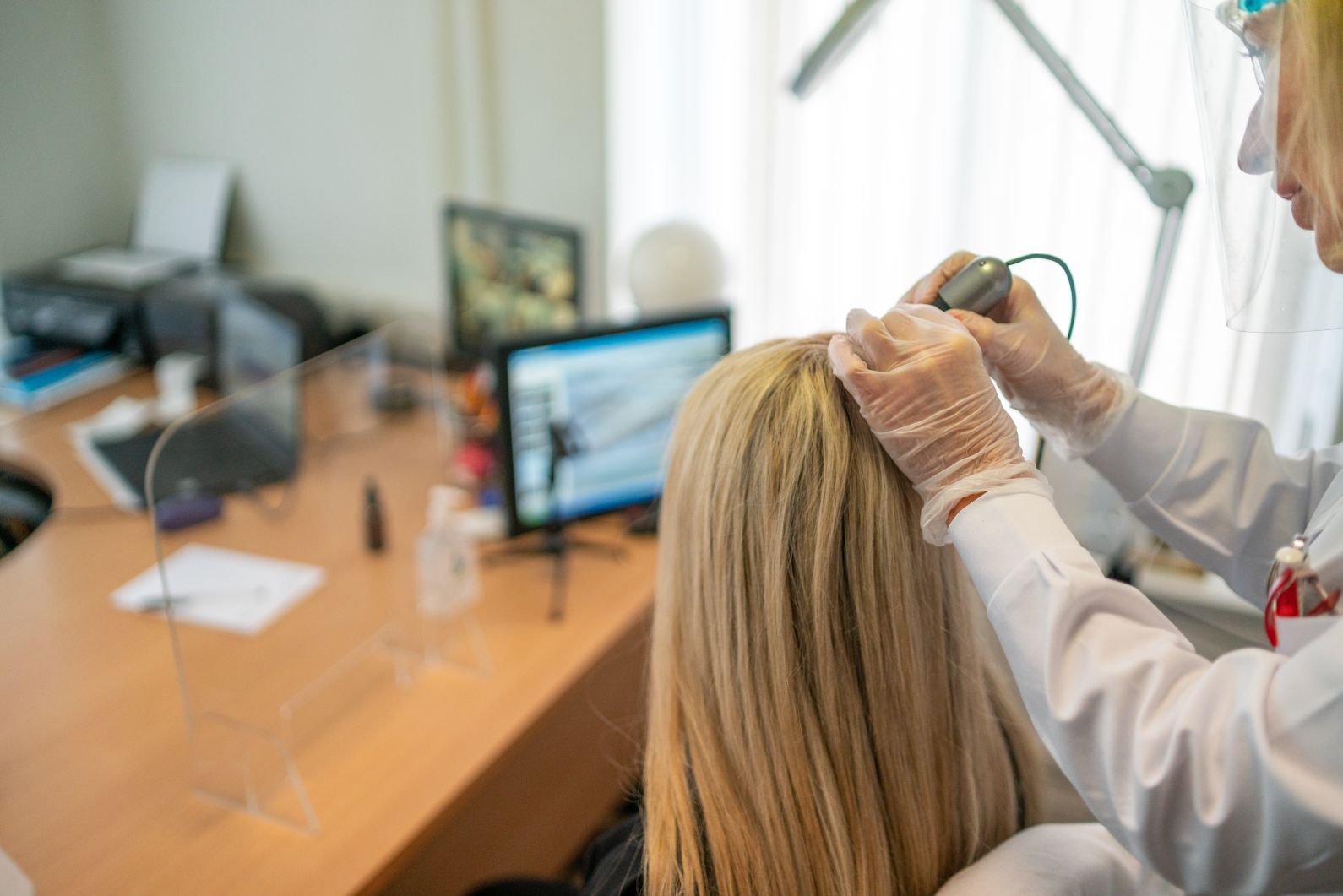Hair loss is a common concern among men and can significantly impact self-esteem and overall well-being. Male pattern baldness is the most prevalent form of hair loss in men. It affects approximately 50% of men over 50 and can occur as early as the late teens or early twenties.
However, with early prevention and the adoption of appropriate treatments and lifestyle changes, it is possible to slow down or even prevent premature hair loss in men. In this comprehensive guide, we will explore effective treatments and lifestyle modifications that can help men in Dublin, who have a higher risk of male pattern baldness, maintain healthy hair and prevent early hair loss.
A Closer Look at Male Hair Loss
What Causes Hair Loss in Men?
As mentioned earlier, male pattern baldness is the most common cause of hair loss in men. Also called androgenetic alopecia, it has a specific pattern of hair loss that follows a predictable progression. It typically starts with a receding hairline at the temples and/or thinning at the crown of the head.
The primary cause of male pattern baldness is a combination of genetic and hormonal factors. Genes inherited from either the mother or father can make hair follicles more sensitive to dihydrotestosterone (DHT), a hormone derived from testosterone. When DHT binds to the hair follicles, it can cause them to shrink over time, leading to progressively finer and shorter hair until they no longer produce visible hair shafts.
Other Factors Contributing to Hair Loss in Men
While genetics and hormones play a significant role in male pattern baldness, there are additional factors that can contribute to male alopecia. Hormonal imbalances, such as fluctuations in testosterone levels, can accelerate hair loss. Some health or medical conditions can also cause balding, such as alopecia areata, an autoimmune disease, and trichotillomania, an impulse control disorder.
Furthermore, certain lifestyle choices can also impact hair health. Smoking, excessive alcohol consumption, and poor nutrition can weaken hair follicles and contribute to hair thinning and loss. Additionally, some medications, such as those used for chemotherapy or treating high blood pressure, can have hair loss as a side effect.
Identifying Early Signs of Hair Loss
The Difference Between Normal Shedding and Excessive Hair Loss
Seeing strands of hair on your pillow or shower drain can be alarming. But experiencing hair fall doesn’t automatically mean you have male pattern baldness or other hair loss condition. This is why understanding the difference between normal shedding and excessive hair loss is crucial in identifying potential hair loss issues.
It is normal to lose around 50 to 100 strands per day as part of the natural hair growth cycle. However, if you notice an increase in hair fall or significant thinning, it could be a sign of excessive hair loss.
Pay attention to changes in the thickness of your hair, the widening of the parting line, or the visibility of the scalp. If you observe such signs, it is imperative to seek professional advice to determine the underlying cause and take appropriate preventive measures.
Common Indicators of Male Pattern Baldness
Male pattern baldness typically follows a specific pattern that can help identify its early signs. The most common indicators include a receding hairline and thinning hair on the crown of the head.
Initially, the hairline may recede from the temples, creating an “M” shape. Over time, the hairline may continue to move back, leading to a more pronounced forehead. At the same time, hair on the crown of the head may become thinner, resulting in a bald spot or partial baldness.
Self-Assessment Techniques for Detecting Hair Thinning and Receding Hairlines
Regular self-assessment of your hair can help you uncover early signs of hair thinning and receding hairlines. Additionally, using self-assessment techniques can help you monitor the progression of hair loss and take timely action.
So, what can you do to detect hair loss issues? Take a closer look at your hairline and compare it to old photographs to identify any changes. Look for signs of thinning, such as a more prominent forehead, a widening part, or a visible scalp through the hair. You can also gently run your fingers through your hair to check for excessive hair fall or notice if the texture feels finer than before.
Importance of Regular Scalp Examinations and Professional Consultations
In addition to self-assessment, scheduling regular scalp examinations with a hair loss specialist is essential, especially if you have a family history of male pattern baldness. These professionals have the expertise to evaluate your hair and scalp health, identify early signs of hair loss, and provide accurate diagnoses.
Moreover, they can determine the underlying causes of your hair loss and recommend appropriate hair growth treatments or lifestyle changes tailored to your specific needs. Remember, early detection and professional guidance play vital roles in effectively preventing and managing hair loss.
Lifestyle Changes for Hair Loss Prevention in Men
Hair loss can be a frustrating and emotional experience. But do not despair, as solutions are available to help you manage your alopecia.
While there is no cure for most types of alopecia – including male pattern baldness, several lifestyle changes can help prevent or slow the progression of hair loss.
Some of the most common lifestyle changes that can help prevent hair loss include:
Balanced Diet and Nutrition
A balanced diet that includes essential nutrients is crucial for maintaining healthy hair. Nutrients like vitamin A, B vitamins, zinc, and omega-3 fatty acids are particularly beneficial for hair health.
Vitamin A helps produce sebum, a natural hair conditioner. It can be found in carrots, sweet potatoes, and spinach. B vitamins, such as biotin (vitamin B7), support healthy hair growth and can be obtained from sources like eggs, whole grains, and leafy greens.
Meanwhile, zinc is essential for hair tissue growth and repair and can be found in oysters, beef, and pumpkin seeds. Omega-3 fatty acids nourish the hair follicles and scalp and can be obtained from fatty fish like salmon and mackerel, walnuts, and flaxseeds.
Ensuring you get enough of these nutrients into your diet can lead to healthy hair growth and prevent early hair loss.
Stress Management
Chronic stress can significantly impact hair health and contribute to hair loss. When you are under stress, the body produces cortisol, a hormone that can disrupt the natural hair growth cycle. Hence, managing stress effectively is essential for maintaining healthy hair.
So, consider incorporating stress-reduction techniques into your daily routine, such as meditation or mindfulness exercises. These practices can help calm the mind, reduce stress levels, and promote overall well-being.
Regular exercise is also an excellent way to manage stress, as it releases endorphins, known as “feel-good” hormones. Engaging in activities like walking, jogging, or yoga for at least 30 minutes daily can help reduce stress and support healthy hair growth.
Additionally, prioritising adequate sleep is crucial. During sleep, the body repairs and rejuvenates itself, including the hair follicles. Aim for 7-8 hours of quality sleep each night to ensure optimal hair health.
Hair Care Practices
Proper hair care practices can significantly impact the health and strength of your hair. Adopting a gentle approach to hair handling can help minimise damage and prevent traction alopecia and other forms of hair loss.
Avoid aggressive brushing, combing, or towel-drying, as these can lead to hair breakage. Instead, use a wide-toothed comb or a brush with soft bristles to detangle your hair, starting from the ends and working your way up.
Limit the use of heat-styling tools like hairdryers, curling irons, and straighteners, as excessive heat can damage the hair shaft. Allow your hair to air dry whenever possible, and if you must use heat, use a heat protectant spray and set the tool to a lower temperature. Similarly, reduce the frequency of chemical treatments like perming, relaxing, or colouring, as these can weaken the hair and make it more prone to breakage.
Choose hair products, including shampoos, conditioners, and styling gels, that are mild and free from harsh chemicals. Look for products specifically formulated to promote hair health and prevent hair loss. Taking these hair care practices into consideration can contribute to maintaining healthy hair and reducing the risk of early hair loss.
Effective Treatments for Hair Loss in Men
Apart from the lifestyle changes mentioned above, treatments for male alopecia are available in Ireland. These medications and procedures effectively slow down hair loss and/or promote hair growth.
 Hair Loss Medications and Topical Treatments
Hair Loss Medications and Topical Treatments
Several medications and topical products have been approved for treating pattern baldness and other hair loss conditions in men. One commonly used treatment is a drug that works by widening the hair follicles, stimulating hair growth, and prolonging the hair growth phase. Widely available over the counter as a topical solution, this male hair loss treatment delivers noticeable results in six months.
Another medication used for treating hair loss works by inhibiting the production of DHT, the hormone responsible for shrinking hair follicles in male pattern baldness. This prescription drug is available in tablet form and should be taken as prescribed by a healthcare professional. It’s important to note that this medicine may have potential side effects, and it is recommended to discuss them with your healthcare provider before starting the treatment.
Other topical treatments, such as shampoos or serums containing ingredients like saw palmetto, may also be recommended by your hair and scalp specialist to help promote hair growth and prevent further hair loss.
Hair Transplantation
Hair transplantation is a surgical procedure that involves transferring hair follicles from areas of the scalp that are resistant to hair loss (typically the back or sides of the head) to the thinning or balding spots. It is an effective and long-lasting solution for restoring hair density and improving hair appearance. The procedure is performed under local anaesthesia, and the transplanted hair follicles grow naturally in their new location.
Hair transplantation requires careful evaluation and planning by a qualified hair transplant surgeon. They will assess factors such as the availability of donor hair, the extent of hair loss, and the desired outcome to create a personalised treatment plan.
Laser Hair Growth Therapy for Male Alopecia
Non-invasive treatments such as low-level laser therapy (LLLT) can effectively stimulate hair follicles and promote hair growth. LLLT uses red light wavelengths to increase blood flow to the scalp, improve cellular metabolism, and promote hair growth. This treatment is typically delivered through specialised devices or combs that emit low-level laser light.
Laser hair growth therapy is a non-invasive procedure, which is why it has grown in popularity over the years. It is also more affordable than hair transplantation.
Seeking Professional Advice – A Must for Male Alopecia Sufferers
One of the biggest mistakes that hair loss sufferers make is diagnosing and treating their condition by themselves. Don’t make the same mistake!
Hair loss has many causes, and identifying the exact reason for the alopecia is key to successful treatment. Determining the cause of hair loss requires knowledge, experience, and tools. This is where qualified alopecia specialists come in.
Importance of Consulting a Hair Loss Specialist
If you are experiencing significant hair loss or want to explore treatment options, seeking professional advice from a specialist like a trichologist or a dermatologist is crucial. These professionals have the expertise and knowledge to evaluate your condition, provide an accurate diagnosis, and recommend the most suitable treatments based on your unique circumstances. They will consider factors such as the extent of hair loss, your overall health, and any underlying medical conditions to create a personalised treatment plan.
Available Treatment Options and Personalised Recommendations
During your consultation, the hair loss specialist will discuss the available treatment options and provide recommendations based on your specific needs. They may recommend a combination of treatments, such as medications, topical treatments, laser therapy, or hair transplantation, depending on the severity of your hair loss and your individual goals. They will guide you through the potential benefits and risks of each treatment option, helping you make an informed decision.
Researching Reputable Hair Loss Clinics in Dublin
When seeking professional advice for hair loss, it is essential to research reputable clinics in Dublin. Look for professionals with expertise in hair loss and a proven track record of successful alopecia treatments in men.
Reading reviews and seeking recommendations from trusted sources can help you make an informed decision. Additionally, consider scheduling consultations with multiple specialists to compare their recommendations and determine which aligns best with your goals and preferences.
In conclusion, preventing early hair loss in men requires a comprehensive approach that combines effective treatments and lifestyle modifications. By understanding the causes of hair loss, identifying early signs, and adopting healthy habits, men in Dublin can take proactive steps to maintain healthy hair and prevent premature baldness.
Remember, seeking professional advice is crucial for accurate diagnosis and tailored treatment plans. So, work with a trusted trichologist and embrace the opportunity to take control of your hair health and restore your confidence. With the right treatments and lifestyle changes, you can safeguard your hair and enjoy a fuller, healthier head of hair for years to come.
Do you have a family history of hair loss? Worried you may be suffering from male pattern baldness? Our trusted trichologist is experienced in preventing early hair loss in men! Call us now on +353 (0)1 679 3618 or click here to book your first consultation!
Royalty-free image supplied from Pexels as part of the SEO service from 3R






